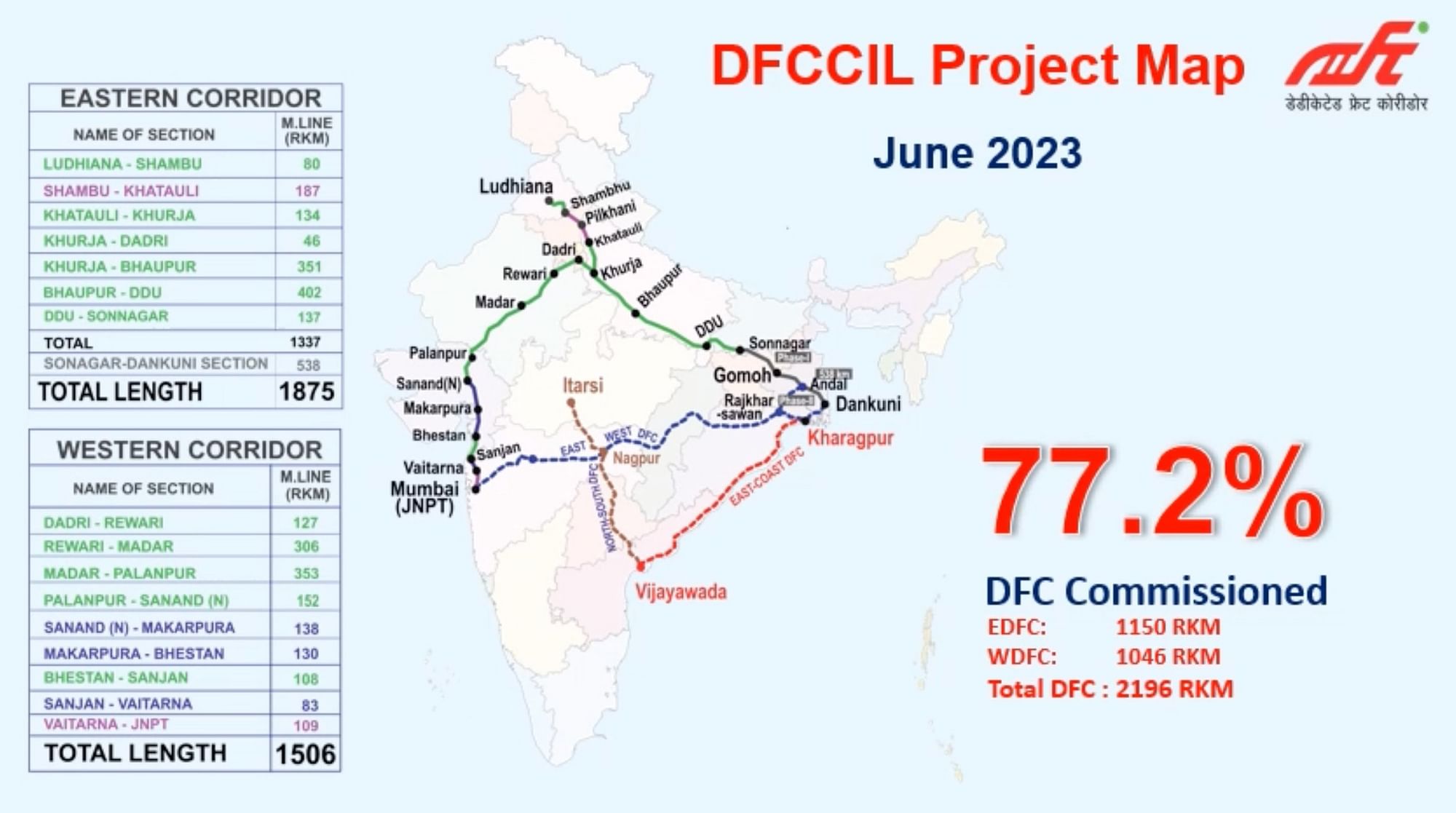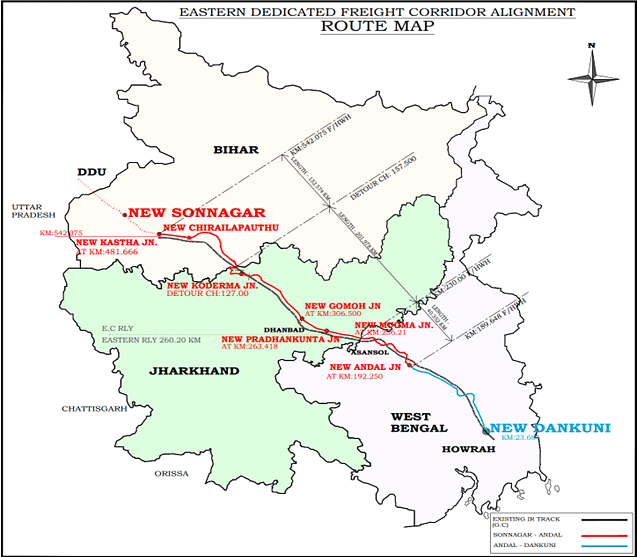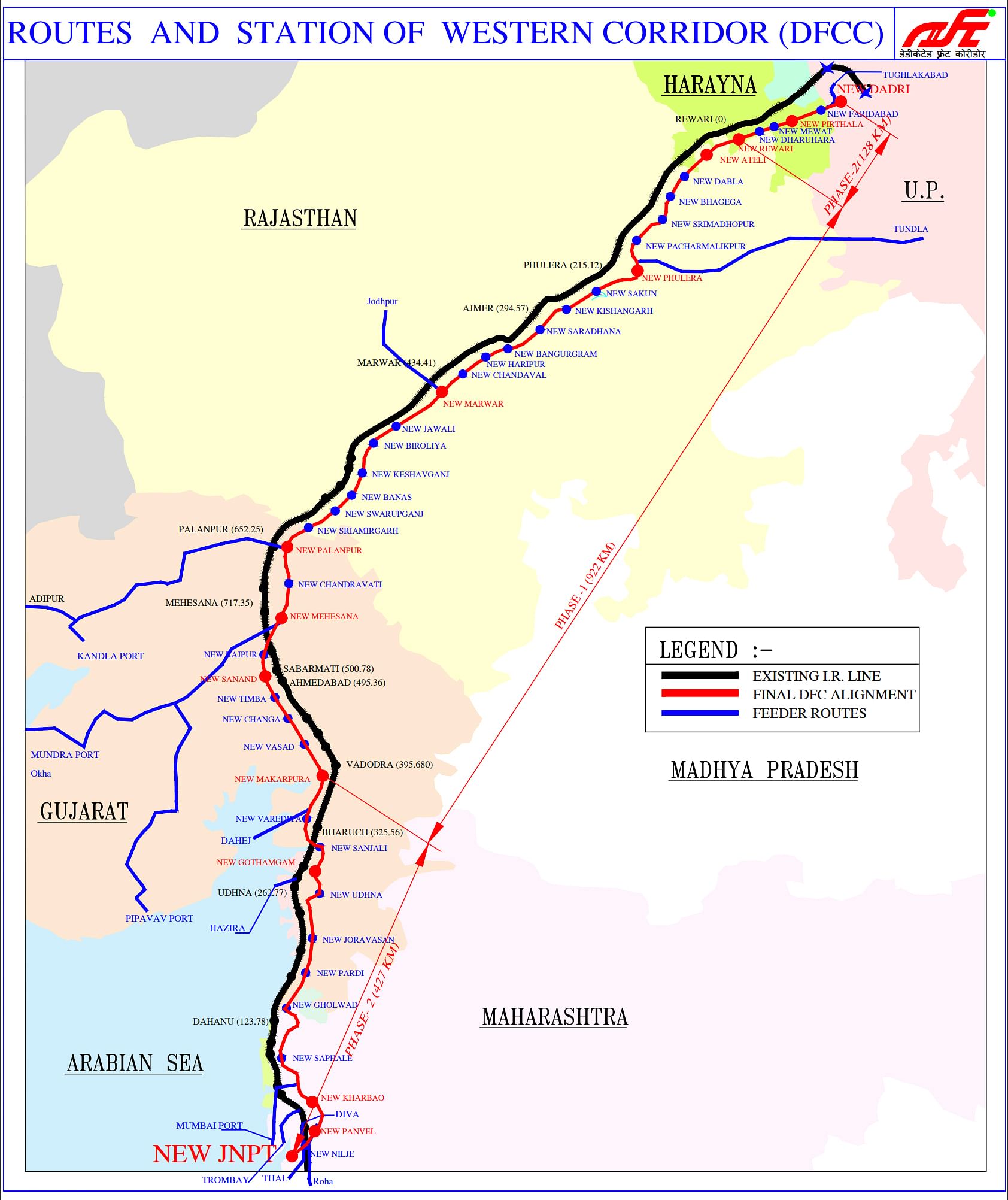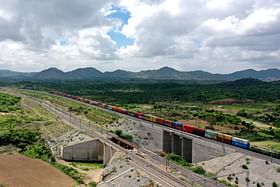About 1,046 km of the western dedicated freight corridor and 1,150 km of the eastern dedicated freight corridor have been commissioned.
As of June 2023, 77.2 per cent of the Dedicated Freight Corridors (DFC) project has been commissioned, according to the Ministry of Railways.
Dedicated freight corridors are proposed to adopt world-class and state-of-the-art technology. Significant improvement is proposed to be made in the existing carrying capacity by modifying basic design features.
The permanent way will be constructed with significantly higher design features that will enable it to withstand heavier loads at higher speeds.
Simultaneously, in order to optimise the productive use of the right-of-way, the dimensions of the rolling stock are proposed to be enlarged. Both these improvements will allow longer and heavier trains to ply the DFCs.
In the first phase, the government of India approved the construction of two corridors — the 1,875 km long eastern dedicated freight corridor (EDFC) and the 1,506 km long western dedicated freight corridor (WDFC).
The ministry stated that 1,046 km of the WDFC and 1,150 km of the EDFC have been commissioned. Additionally, out of the 543 major bridges, 454 have been completed, reports Financial Express.

In a tweet, the ministry shared a video highlighting the importance of dedicated freight corridors in reducing logistic costs and meeting the growing demand for freight transportation.
Dedicated Freight Corridors play a vital role in reducing logistic costs and meeting ever-increasing freight transportation needs.#Hungry4Cargo #RailInfra4India pic.twitter.com/FjY087As6J
— Ministry of Railways (@RailMinIndia) July 19, 2023

Prime Minister Narendra Modi flagged off the DFC network’s inaugural train on 12 December, 2020.
DFC is critical to the National Logistics Policy to lower logistics costs from 15 per cent of GDP to 8 per cent by 2030.
DFC’s freight infrastructure capacity increase is critical to achieving Indian Railways’ goal of 3,000 MT freight loading by 2030.
Eastern Dedicated Freight Corridor
The Eastern Dedicated Freight Corridor (EDFC) spans 1,337 km from Sahnewal near Ludhiana in Punjab, crossing through Haryana, Uttar Pradesh, and terminating at Sonnagar in Bihar.
As part of this freight corridor, the overall 538 km stretch between Sonnagar in Bihar and Dankuni in West Bengal was proposed to be executed under the public-private partnership (PPP) mode since the beginning.
This stretch was intended to be the apex of the railway’s monetisation efforts, providing private-sector players access to the corridor’s traffic.

For the 371 km stretch between Sonnagar (Bihar) and Andal (West Bengal) — proposed to be the first PPP project — the Dedicated Freight Corridor Corporation of India (DFCCIL) had reworked the proposal to attract bidders for the Rs 12,000-crore project and de-risk the private concessionaire.
The project was revised to be developed via a design, finance, build, operate and maintain and transfer model.
Western Dedicated Freight Corridor (WDFC)
The WDFC, connecting Dadri in Uttar Pradesh to Jawaharlal Nehru Port (JNPT) in Mumbai, passes through five states of UP, Haryana, Rajasthan, Gujarat and Maharashtra.
The western corridor covers a distance of 1,504 km through double line electric (2 x 25 KV) track from JNPT to Dadri via Vadodara-Ahmedabad-Palanpur-Phulera-Rewari. The Western DFC is proposed to join the Eastern DFC at Dadri.
Western DFC would mainly cover Rajasthan (565 km), Maharashtra (177 km), Gujarat (565 km) Haryana (177 km) and about 18 km in Uttar Pradesh.

Alignment has been generally kept parallel to existing lines except provision of detour at Diva, Surat, Ankleshwar, Bharuch, Vadodara, Anand, Ahmedabad, Palanpur, Phulera and Rewari. However, it is entirely on a new alignment from Rewari to Dadri.
The DFC once constructed will decongest the railways’ network by moving 70 per cent of goods trains to these two corridors.


